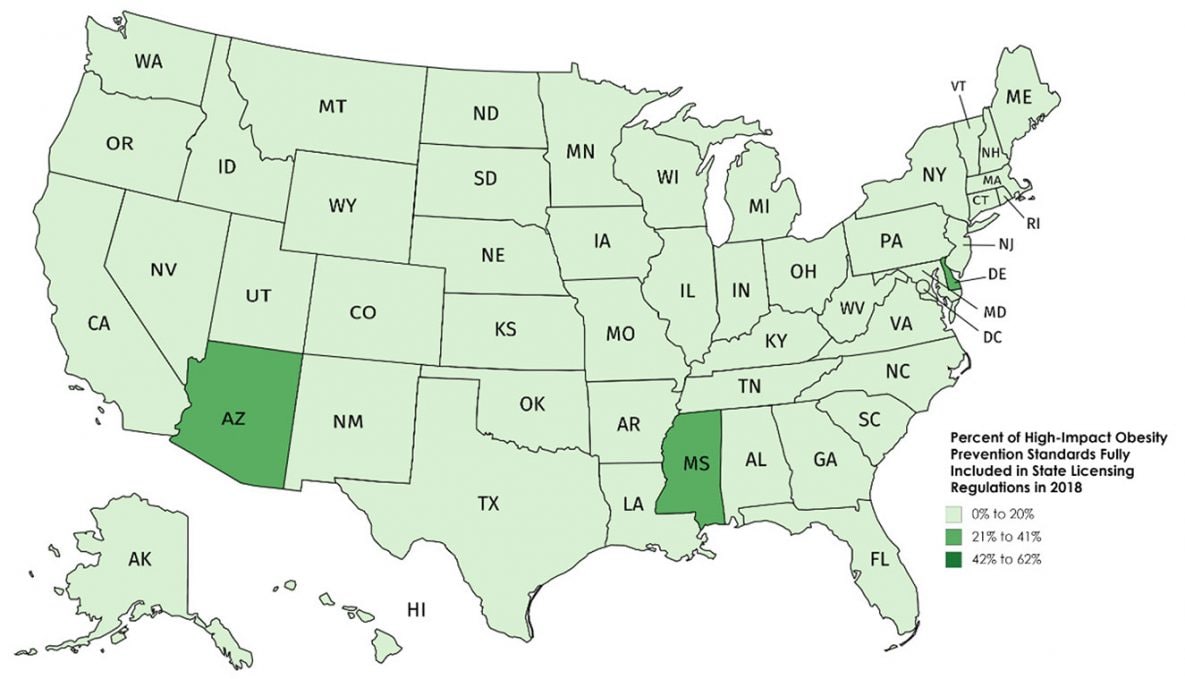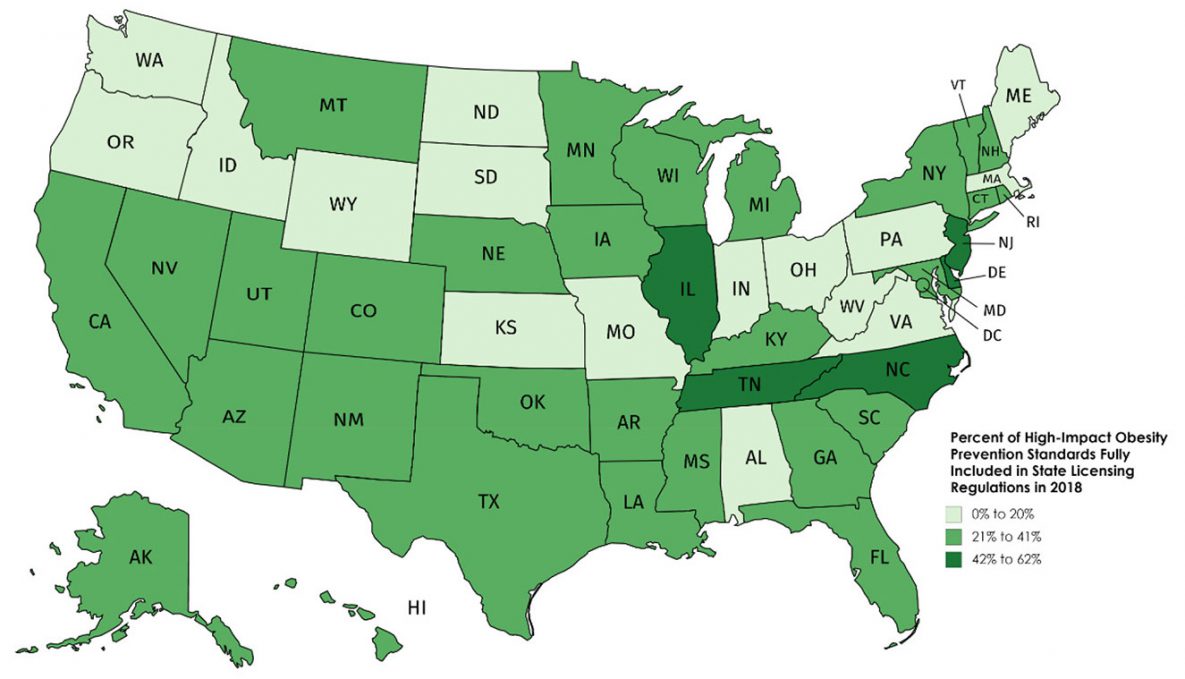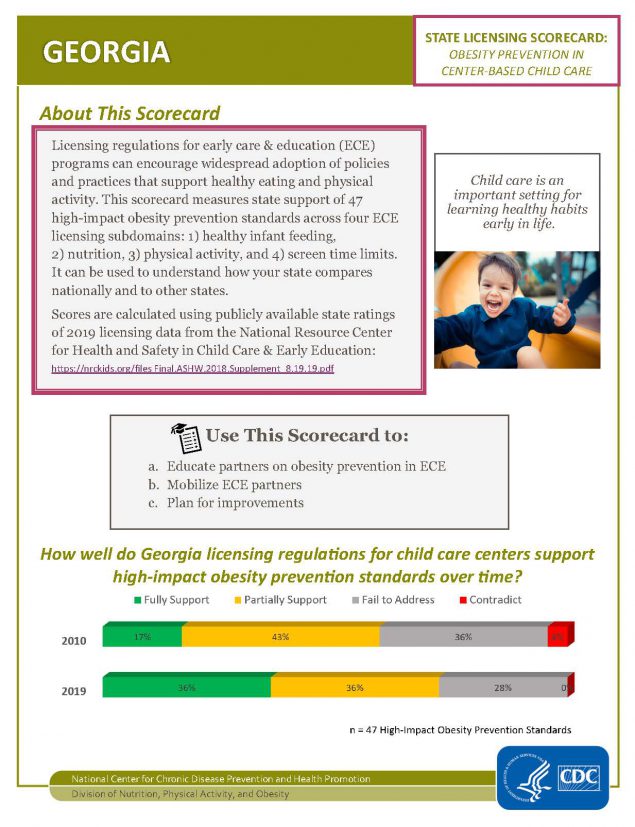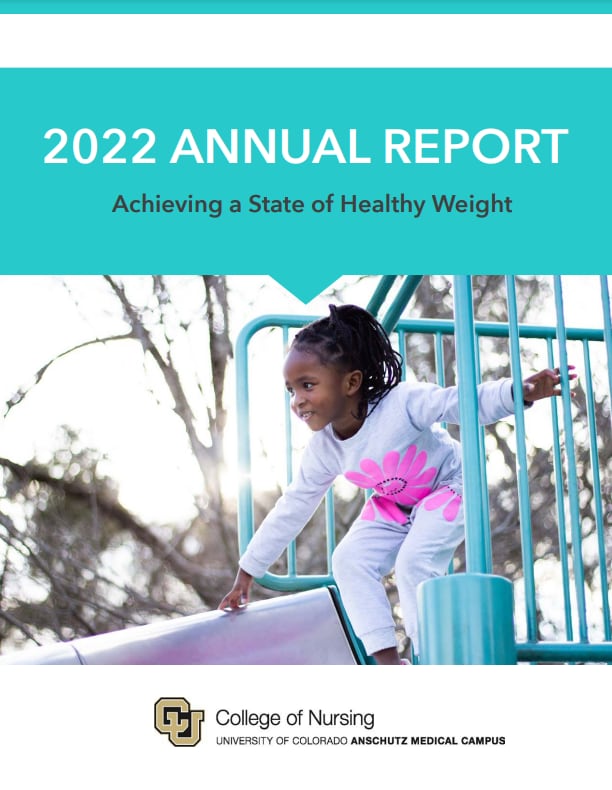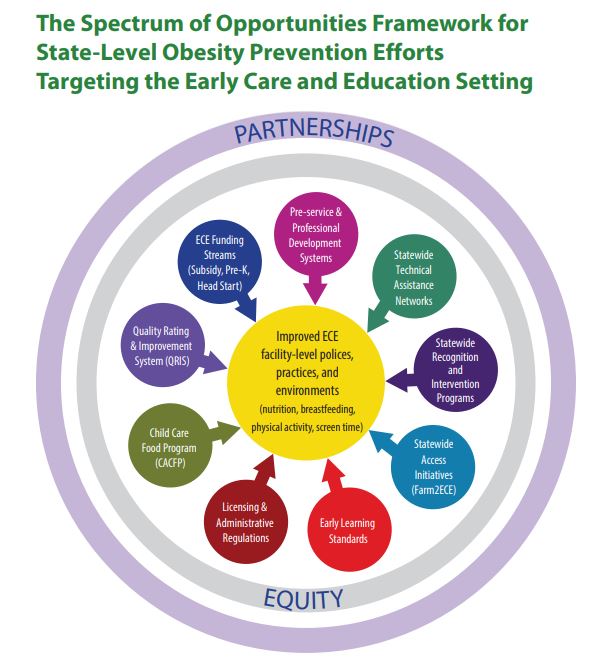State Childcare Licensing as a Tool to Support Obesity Prevention
Across the country, early care and education (ECE) programs, such as childcare centers, large family care homes, and small family care homes, must follow certain regulations to be licensed providers and legally operate.
State-mandated licensing requirements help ensure that health and safety rules are followed by all ECE programs. Licensing regulations can also encourage widespread adoption of science-based practices that promote healthy eating and physical activity. States typically update their licensing regulations about every 3 to 5 years.
By embedding science-based obesity prevention standards into ECE policies and practices, states can equitably invest in a healthier future for their youngest children.
The National Picture
In the last decade, many states have adopted licensing requirements that go beyond traditional health and safety rules to include health-promoting standards, such as infant brain development, emotional well-being, healthy eating, and physical activity.
Caring for Our Children’s (CFOC) national standards represent the “gold standard” in high-quality health and safety policies and practices for ECE programs. The CFOC 3rd edition identified standards to prevent childhood obesity in Preventing Childhood Obesity in Early Care and Education Programs. The supplement identified 47 high-impact standards most likely to prevent childhood obesity when adopted by ECE programs.
Take Action in Your State
Review CDC’s resources to help strengthen childcare policies and practices that support healthy growth through good nutrition, healthy eating behaviors, and physical activity early in life.
Review your state’s State Licensing Scorecard. Use your state’s licensing scorecards to understand areas for improvement in childcare centers and to help mobilize partners to adopt high-impact obesity prevention policies in licensed ECE programs. The scorecards assess how well a state’s licensing regulations support each of the 47 high-impact obesity prevention standards.
See how well your state’s licensing regulations compare to the national average in 6 obesity prevention licensing subdomains:
- Breastfeeding Support
- Infant Feeding Practices
- Nutrition Standards
- Healthy Mealtime Practices
- Physical Activity
- Screen Time Limits
Each year, the University of Colorado College of Nursing releases the Achieving a State of Healthy Weight (ASHW) Annual Report that illustrates how well state licensing regulations support obesity prevention standards.
Find the 2022 national report below, as well as state-specific profiles highlighting ratings by care type.
- 2022 National Report: Achieving a State of Healthy Weight [PDF-2.2MB]
- State Profiles on Licensing Regulations in Child Care Centers [PDF-1.5MB]
- State Profiles on Licensing Regulations in Large Family Child Care Homes [PDF-1.5MB]
- State Profiles on Licensing Regulations in Small Family Child Care Homes [PDF-1.5MB]
Finally, see CDC’s Spectrum of Opportunities [PDF-665KB] for more information on how your state’s ECE system can embed recommended standards and support implementation for obesity prevention at both the state and local level.
State Story
In 2021, 12 states revised ECE licensing regulations related to nutrition, physical activity, screen time, or breastfeeding support, according to data from the National Center for Health & Safety in Early Care & Education. Texas made significant progress in 2021, going from a state obesity prevention summary score of 61%1 in 2020 to 81%2. The state now leads the nation in licensing regulations that support high-impact obesity prevention standards. Read more about their story:
With funding from CDC’s State Physical Activity and Nutrition (SPAN) Program, the Texas Department of State Health Services (DSHS) Obesity Prevention Program (OPP) convened early childhood experts from around the state to adopt and implement a standard set of best practices in early care and education settings (ECE).
As a result of these efforts, Texas DSHS OPP was well-positioned to assist and support ECE programs in meeting the new licensing standards established with the passing of Texas Senate Bill 952 in 2019. Senate Bill 952 required that all Texas ECE facilities meet revised minimum standards for breastfeeding support, infant feeding, nutrition, physical activity, and screen time.
These minimum standards align with the science-based High Impact Obesity Prevention Standards for ECEs in Caring for Our Children and USDA’s Child and Adult Care Food Program. Texas DSHS OPP and other state partners supported ECE facilities through several strategies, such as statewide access to an evidence-based intervention to improve healthy policies and practices in ECE settings called Go NAPSACC. As a result of Texas Senate Bill 952 and Texas DSHS OPP’s implementation support, about 14,250 ECE programs and more than 1.1 million children will benefit from these changes.
Texas’ Guidance and Support for ECE Providers
This guidance outlines the minimum standards for physical activity, nutrition, and screen time:
- Display of March 2021 Changes for 744: Physical Activity, Nutrition, and Screen Time [PDF-339KB]
- Changes in 747 New Requirements for Tummy Time Supervision in Child-Care Homes [PDF-59.9KB]
To help ECE programs implement licensing regulations, Texas launched a statewide recognition program along with online professional development training and a quality seal for outdoor learning environments:
- Recognition Program: Texas Healthy Building Blocks
- Quality Seal: Outdoor Learning Environments (OLE! Texas)
- National Resource Center for Health and Safety in Child Care and Early Education. 2021. Achieving a state of healthy weight 2020 report. Aurora, CO: University of Colorado Anschutz Medical Campus.
- University of Colorado College of Nursing. 2022 Annual Report: Achieving a State of Healthy Weight. University of Colorado Anschutz Medical Campus; 2023.
